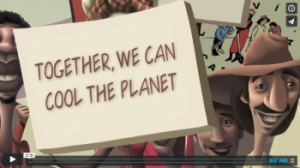This winter, Theresa Schumilas, one of the Research Associates with the Laurier Centre for Sustainable Food Systems is launching a new on-line food market that moves us beyond ‘local’ food systems to truly sustainable food systems. The new ‘COOL’ or ‘CO2L’ market, is a bottom-up solution to help cool the planet. Rather than wait on experts to reach agreements about climate change and come up with plans, these new markets will link consumers with the small-scaled producers around the world who are already cooling the planet through their knowledge and skills.
Buying local is a great thing to do, but, it’s not enough. While it’s good to buy locally grown food for many reasons, ‘food miles’ (the distance food is transported from the time of its production until it reaches the consumer) actually make up a relatively small percentage of the overall carbon footprint of food — approximately 11% on average. In comparison, how our food is grown makes up a much larger percentage — roughly 83% of the food’s footprint. The impacts of food on climate depend less on distant travelled and more on the agronomic decisions the farmer makes. But, with the possible exception of certified organic branding, these climate critical on-farm decisions are seldom highlighted in markets selling ‘local’ foods. Consumers need a way to make clear choices about the carbon consequences of the foods they buy, but so far there is no clear marketplace identity for foods that are produced with climate mitigating methods in Canada. That’s where the new ‘COOL’ (or CO2L) comes in.
 This new COOL market is built on a new open source platform called “Open Food Networks”. This platform will be initiated in Canada by December, as part of Theresa’s work to launch Farm 2.0. To do this, she is working to establish SIMPLE criteria for the COOL designation and recruiting vendors to pilot the market in early 2016.
This new COOL market is built on a new open source platform called “Open Food Networks”. This platform will be initiated in Canada by December, as part of Theresa’s work to launch Farm 2.0. To do this, she is working to establish SIMPLE criteria for the COOL designation and recruiting vendors to pilot the market in early 2016.
Instead of using complicated and costly criteria and verification systems (which would end up excluding small scale farmers), the COOL market is drawing on the experiences and knowledge of small scaled farmers who have been cooling the planet for centuries.
Together, we can cool the planet! from GRAIN on Vimeo.
They key point is that we know what the main agricultural causes of climate change are, and we know what we need to do to reduce our emissions. We need to think beyond local. We need to learn from, and support small scale farmers around the world. Together we can COOL the planet.
Read the full post here.
If you are interested in getting involved in this – contact Theresa: tschumilas (at) rogers.com

